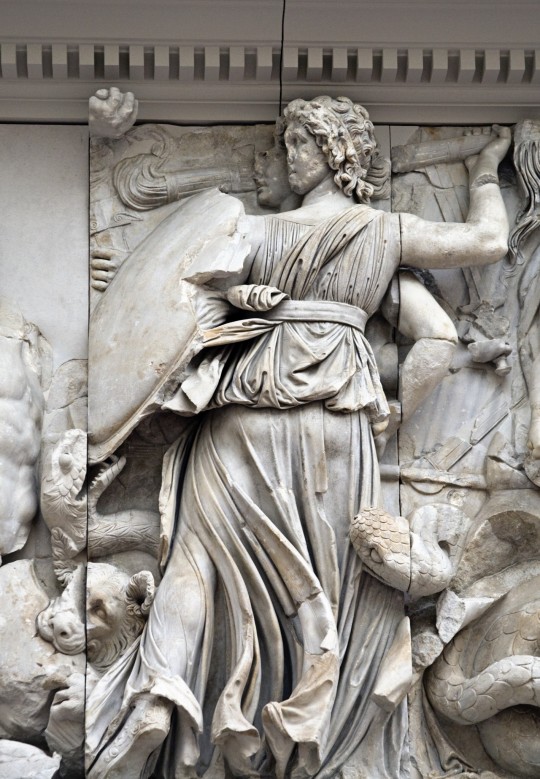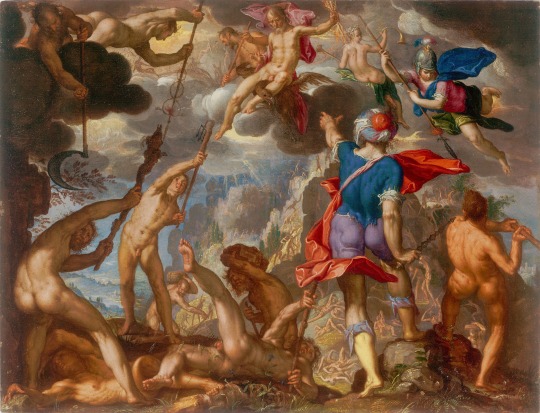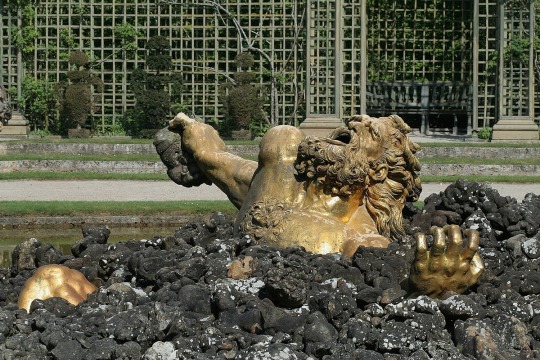#gigantomachy
Text
Hippolyta's baby egg warrior
Years before Diana's birth in the Era of Myths Before Themyscira existed,
Hippolyta had found the egg as she was in this temple; she wasn't sure who or why she took it with her. But she did, and she took care of him pretty well.
And out came a tiny boy. She and her sister, along with her father, Ares, took care of him. As he got older, Danny started to collect women and girls who weren't treated well and "kidnapped" them to her island. This wasn't how she wanted to build Themyscira! But it worked pretty well.
And it had been a good idea to take him with her as the war against the Giants started. Her child was in front of the Gigantomachy! And Daniil/Daniel did pretty well, until his defeat by the Dark Giants.
She didn't trust what Hercules told her, but after that, she closed her island to outsiders; the war was won after all.
+
After weakening the Giants enough that Arion could later finish them off, Danny was pulled into the future. At least what he learned helped in his fights against the ghost in Amity Park.
But it had been a fun adventure, and he hates that stupid seal! Stupid Vlad and wanting to make him his son, and then losing the seal! That is why he ended up in the egg.
+
Modern time
Wonder Woman was captured by a cult that seemed to plan to use her blood for a ritual. And after she escaped and had a few cultists captured with her friends,
She had no idea what the captured cultist was talking about as she left to visit her mother. The legend said he was Hippolyta's son; she would know if her mother had another child after all.
+
In Amity Park
Danny noticed the glowing as he fought Skulker and was like, "Not again!"
Before he was teleported and away back in an egg, the cult was happy!
They summoned the egg; all they have to do is incubate it! And then they have their own warrior!
+
And as later Hippolyta learned about her egg having been returned by Diana. She and a group of warriors were on the hunt to find the cult and take the egg before it hatched.
#danny phantom#dcau#dc comics#dc#dp#dp x dc#danny fenton#dc x dp#dp + dc#Danny the Egg#Hercules#Hippolyta#wonder woman#cultist#vlad master#Vlad's fault!!#seal = egg = son danny!#Gigantomachy#Arion#Cultist of the Egg#cult of the Egg Warrior#Skulker#diana of themyscira#Baby danny comes out of the Egg again#de-aged Danny#reborn danny??
468 notes
·
View notes
Text

An episode from the Gigantomachy: Poseidon, wielding his trident, attacks the Giant Polybotes, while Gaia (from whom the Giants sprang) looks on. Interior of an Attic red-figure kylix (drinking cup) by the painter Aristophanes; ca. 410 BCE. Now in the Antikensammlung Berlin. Photo credit: Sailko/Wikimedia Commons.
#classics#tagamemnon#Ancient Greece#Classical Greece#classical mythology#Greek mythology#Gigantomachy#Poseidon#art#art history#ancient art#Greek art#Ancient Greek art#Classical Greek art#vase painting#red-figure#kylix#Antikensammlung Berlin
196 notes
·
View notes
Text
Screaming while thinking about how Dionysus got introduced to Olympus.
Beginning his life (if you don't count the Orphic myths) he's handed to Hermes who's constantly trying to find a babysitter for him while Hera is hunting him down. Eventually he goes to live with Rhea for a bit and then trains with Chiron before going out and exploring and stuff.
The Gigantomachy. Dionysus is either on the verge of ascending to godhood of a VERY VERY new god when Zeus announces it's time to go fight great-grandma's new batch of kids. Heracles is still kicking during this time, and Heracles is also sometimes there when Dionysus goes down to the Underworld to get his mother and ascend to Olympus, so they're around the same age-ish. So yeah, great introduction to the fam.
Then. The Trojan War. The Trojan War would only be maybe a decade and a half later, really. Considering Heracles is in the Gigantomachy, and in that one myth he accidentally kills (?) Chiron, Achilles is just there in the background. There's also something about him fistfighting the brother of Tyndareus, the (adoptive) father of Helen. Dionysus isn't mentioned in the Iliad (I don't think) probably because he and his new wife Ariadne are hiding under their blankets in absolute horror of Olympus. Imagine Dionysus chatting with Apollo or Poseidon after the Gigantomachy and then watching them absolutely go murderous during the Trojan War. Dionysus is just sitting there in the background while Athena drags Ares and Aphrodite and Hera whoops Artemis' ass.
And then??? Everyone just goes back to being chill again??? Apollo is no longer murdering absolutely everyone but instead defending his bestie Orestes in court??? Athena isn't being a crazy bloodthirsty madwoman and has taken up a new gig as a judge??? Dionysus turns to Hermes and is like "is this normal??!3?$$@" and Hermes just sighs really loudly and nods.
#i just know this boy was scared shitless for a while#he wouldnt look anyone in the eye for ages#man thought HE was crazy but he didnt know crazy til he learnt that family get-togethers are really just everyone trying to murder each othe#ariadne side eying her new hubby like boy wtf is wrong with your fam#them two spend the entire trojan war peeking out from under their bedcovers like they were watching the horror movie of all horror movies#ariadne#dionysus x ariadne#dionysus#apollo#hermes#gigantomachy#trojan war
54 notes
·
View notes
Text
Ancient Greek texts never make an explicit connection between the Gigantomachy and Hera causing the storm that drove Herakles to Kos and subsequently being bound and hanged in the sky by Zeus, though we do know from various sources that Herakles played a major role in the battle against the Gigantes, that the participation of a mortal was necessary for the gods to win, that Athena brought Herakles from Kos to Phlegra so that he could fight together with the gods, and even that Herakles encountered some serious trouble on Kos and needed to be saved. All of these details are not really linked together in one single account, to be sure, but the connections are there if one wants to make them, and doing so serves to add some reasoning to a few details that are strange and left unexplained.
To start with, why should Hera be so severely punished for what prima facie seems a relatively minor offense? Sending Herakles off course might be inconvenient, but is it as serious as, say, manipulating Zeus into swearing an oath that a descendant of his will rule over all his neighbours and then contriving that the descendant in question is Eurystheus rather than Herakles as Zeus had intended? Or sending serpents to attack Herakles as a baby? Or driving him mad and making of him a kinslayer and filicide? Or is it worse than her persecutions of Dionysos, or of Leto, a fellow deity? And yet, we never hear of Hera being punished for any of those other things, only for this one instance of meddling with Herakles at sea.
Then there is also the fact that Hera's hanging is attributed not only to Zeus's anger at her persecution of Herakles as it is in the Iliad and in the Bibliotheke, but it is also, in the Iliad scholia and in the Argonautica of Valerius Flaccus, claimed to be a punishment for her rebellion against the rule of Zeus. Assuming that Zeus was not so uncreative as to use the same punishment on Hera twice, then a scenario where she sends Herakles to Kos for the express purpose of preventing him from joining the Gigantomachy (where his presence was necessary for the gods' victory) would also constitute a conspiracy against Zeus's regime, and would more or less neatly combine both variants.
And what about that moment in the Gigantomachy itself when Zeus makes Porphyrion assault and almost rape Hera? It is a strange thing to do no matter how you look at it and we are given no explanation of what his intentions were. One could suppose that it was simply a careless distraction tactic that made it easier for Zeus and Herakles to subdue a powerful adversary, or it could have been a deliberate move by Zeus to indebt Hera to Herakles (he is also the one who suggests that Dionysos could help Hera when she is bound on her throne in Homeric Hymn 1). Or it could just as well have been a punishment that Hera was subjected to for some reason, say, her previous alliance with the enemies of Zeus, and such an interpretation doesn't have to contradict any of the others. Zeus could have meant at the same time to distract Porphyrion, punish Hera, reconcile Hera and Herakles, or any other combination.
As for Hera and her motivations, we know that she has worked against Zeus and allied herself with his adversaries in multiple myths: in the Iliad she is one of the gods who wanted to bind Zeus; in Homeric Hymn 3 she invokes Gaia, Ouranos and the Titans when she prays for a child more powerful than her husband; in a scholion on the Iliad that relates another variant of Typhon's origins, Gaia approaches her after the defeat of the Gigantes with complaints about Zeus and Hera in turn asks Kronos for assistance; in Hyginus' Fabulae Hera encourages the Titans to remove Zeus from power and restore the rule of Kronos. All of which to say that Hera initially wanting the children of Gaia to defeat the gods in the Gigantomachy could be in character for her and consistent with her portrayal in various sources, even if this aspect of her persona is never properly explored or given the attention it deserves. It is, if nothing else, an interesting interpretation.
28 notes
·
View notes
Text
I know they are never both stated as the parents of the charities at the same time, but I choose to interpret Helios and Eurynome as their parents. Eurynome so that she raises Hephaestus as her own along with her daughters and Helios bc he seems like a genuine bro to Hephaestus not only telling him about Aphrodite cheating but also rescuing him during the Gigantomachy.
Maybe whenever Helios would visit his daughters he’d spend time with Hephaestus as well and was kinda a father figure to him, which Hephaestus appreciated since Zeus literally threw him off Olympus for trying to protect Hera.
#greek mythology#ancient greek mythology#greek pantheon#hephaestus greek mythology#hephastios#hephaestus god#hephaestus#helios#helius#helios god#charities#graces#aglaia#gigantomachy
14 notes
·
View notes
Photo

Giants
In Greek mythology, the Giants (Gigantes) are an aggressive race of creatures who were born from Gaia (the Earth) after drops of Uranus' blood fell on the Earth after he was castrated. The Giants had great strength and were fearsome to look upon, with long hair and scaly feet.
Continue reading...
52 notes
·
View notes
Text

Hecate fighting in the Gigantomachy 🗡🏹
The triple bodied Titaness carries her flaming torch, a spear and sword as she engages the giant Clytios in battle. One of her dogs bites the giant on his snake leg 🏛
From the Battle of the Gods and Giants on the great altar of Zeus at Pegamon. On display in the Pergamon Museum in Berlin 🏛🏛
#hecate#titaness#triple bodied#gigantomachy#battle of gods and giants#pergamon altar#pergamon museum#berlin#bloody awesome#🏛🏛
9 notes
·
View notes
Text
Hecate: Triple-Bodied Greek Goddess of Witchcraft and Keeper of Keys | Ancient Origins
Hecate: Triple-Bodied Greek Goddess of Witchcraft and Keeper of Keys | Ancient Origins
https://www.ancient-origins.net/myths-legends-europe/hecate-0010707

View On WordPress
#600 BC#8th century#Anatolia#Ancient Greece#Artemis#Asteria#Caria#Clytius#Cult#Demeter#Gigantomachy#Goddess#Greek#Greek Pantheon#Hades#Hecate#Helios#Hera#Hesiod#Homer#King Priam#Leto#Necromancy#Oikos#Olympians#Persephone#Perseus#Pheraea#Queen Hecuba#Tartarus
4 notes
·
View notes
Text




uhhh i tried compiling some of my favorite cake bake betty lyrics into a.thing
#cake bake betty#poetry#?#lyric posting#the spine song#song of the sea#gigantomachy#jesus and austria
5 notes
·
View notes
Text
#greekmythology#education#history#greekgods#gods#greekmyth#greekmythologystories#ancientlegends#zeus#gaia#gigantomachia#gigantomachy#heracles#redcows#kidnappingredcows
1 note
·
View note
Text

The Battle Between the Gods and the Giants, Joachim Wtewael, 1600
#art#art history#Joachim Wtewael#classical mythology#mythological painting#Gigantomachy#Gigantomachia#Mannerism#Mannerist art#Northern Mannerism#Dutch Mannerism#Dutch art#16th century art#oil on copper#Art Institute of Chicago
102 notes
·
View notes
Text

#greek myth#greek gods#god of wine#gigantomachy#selenis#dionysus#cylenis#see you in history/mythology
1 note
·
View note
Text
"We are told that Hera’s punishment with the golden chain was provoked by the discovery that it was she who had contrived to send Heracles to Cos (14.249-56; 15.18-30). According to later writers (Apollod. 2.7.1 and Plu. Mor. 304c-d), the story runs as follows: having sacked Troy, Heracles encountered a storm sent by Hera; driven to Cos, he was attacked, wounded and almost killed by the people there. From this crisis he escaped either because he was rescued by Zeus (Apollodorus), or because he hid in the house of a Thracian woman, in whose clothes he dressed himself and fled (Plutarch). Then, summoned by Athena, he went to Phlegra to fight against the Gigantes. (...)
We must now recall the curious role of Heracles in the war against the Gigantes. A scholion to Pindar’s Nemean 1.101 informs us of his contribution to the war: Phlegra is a place and a village in Thrace, where the Gigantes were defeated by the gods. When the gods were engaged in battle with them, and could not prevail over the Gigantes, they say that Gaia told that the Gigantes would not be defeated unless two of the demi-gods should fight as the gods’ allies. When Heracles and Dionysus joined the battle, the gods triumphed over the Gigantes. (schol. Pind. Nem. 1.101) Apollodorus (Bibl. 1.6.1) offers a similar story: the gods received an oracle stating that none of the Gigantes could perish at the hands of the gods, but they would be destroyed with the help of a mortal. So, Zeus summoned Heracles by means of Athena: Now an oracle was given to the gods that none of the Gigantes could be destroyed by them, but if a mortal should fight as their ally, they could overcome them. Learning of this, Earth sought for a medicinal plant to prevent the Gigantes from being destroyed even by a mortal. But Zeus, on the one hand forbade Dawn and the Moon and the Sun to shine, and he cut off the medicinal plant himself, before anybody else could get it, and on the other hand, by means of Athena, he summoned Heracles to fight as his ally. (Bibl. 1.6.1)
It is clear from these accounts that Heracles’ intervention in the war against the Gigantes was crucial. This is why he was helped by Athena on Cos, and was taken to the battle against the Gigantes. This explains why it was to Cos that Hera sent Heracles: Hera attempted to render him unable to join the war. According to the traditional story pattern, Hera persecuted Heracles out of jealousy; but another version can perhaps be seen behind Hera’s hostility to Heracles, if we read this story in the light of the Gigantomachy. Had her plan been successful, Zeus would have been defeated by the Gigantes, and it could be for this treachery that Zeus punished her by binding her with the golden chain. The Iliad states that Hera’s plot against Heracles resulted in the harsh punishment of binding. Heracles’ status as the beloved son of Zeus is offered as a reason for the severity of the punishment. We can, however, suggest a further cause for a punishment which appears overly stringent merely for diverting a mortal off his course – even though Zeus’ punishments were sometimes disproportionate to the crimes. I suggest that this harsh punishment would be appropriate for an attempt to overthrow Zeus’ sovereignty."
- Noriko Yasumura , Challenges to the Power of Zeus in Early Greek Poetry
#headcanon accepted#gigantomachy#gigantomachia#heracles#herakles#hera#zeus#quotes#excerpts#hanging of Hera
11 notes
·
View notes
Text
joining the civil war on the side of BLOOD MOUNTAIN and also BONE MOUNTAIN
#*mountains called haemus (haha like. αἷμα. blood) and ossa as in ossum. bones#propertius makes the αἷμα / haemonius as an epithet of achilles pun a few times i think#but lucan is Vibing w the evil thessalian mountain names + also mountains in the gigantomachy#pharsalia#beeps
184 notes
·
View notes
Photo

Géants
Dans la mythologie grecque, les géants (Gigantes) sont une race de créatures agressives nées de Gaia (la Terre) après que des gouttes de sang d'Uranus furent tombées sur la Terre suite à sa castration. Les Géants avaient une grande force et étaient effrayants à regarder, avec de longs cheveux et des pieds écailleux.
Lire la suite...
0 notes
